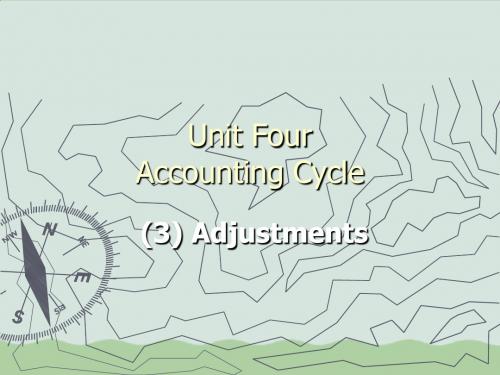会计英语-翻译chapter1培训课件
- 格式:docx
- 大小:26.53 KB
- 文档页数:7





Chapter one Introduction to Accounting 1.1 Bookkeeping and AccountingAccounting is an information system that identifies,measures,records and communicates relevant,reliable,consistent,and comparable information about an organization’s economic activity. Its objective is to help people make better decisions.An understanding of the principles of bookkeeping and accounting is essential for anyone who is interested in a successful career in business. The purpose of bookkeeping and accounting is to provide information concerning the financial affairs of a business. Owners, managers, creditors, and governmental agencies need this information.An individual who earns living by recording the financial activities of business is known as a bookkeeper, while the process of classifying and summarizing business transactions and interpreting their effects is accomplished by an accountant. Accountant is the individual who understands the accounting principles, theoretical and practical application, and can manage, analyze, and interpret the accounting records. The bookkeeper is concerned with techniques involving the recording of transactions, and the accountant’s objective is the use of data for interpretation.第一章['tʃæptə]会计导论[.intrə'dʌkʃən]1.1 簿记与会计会计是一个信息系统,[ai'dentəfai]辨别、['meʒəz]测量、记录和交流相关的['reləvənt]、可靠的[ri'laiəbl]、持续的[kən'sistənt]和可比的['kɔmpərəbl]一个组织经济活动的信息。

第一章财务会计概述第一节会计等式和会计要素§1.1 会计等式会计等式表现会计要素的基本关系,即资产在等式的一端而负债和所有者权益在等式的另一端的一种平衡关系。
所以会计等式为:资产=负债+所有者权益。
§1.2会计要素会计要素包括资产、负债、所有者权益、收入、费用、利润。
§1.2.1 资产资产是企业拥有并控制的经济资源。
可分为流动资产、固定资产、无形资产。
流动资产是短期资产,包括现金、银行存款、应收账款、存货等。
流动资产可于一年内兑现为现金。
流动资产按照流动性排序,因此现金总是排在首位。
固定资产是长期资产,包括土地、建筑物、设备、家具等。
固定资产用于经营,而不能用于销售。
无形资产也属长期资产,包括专利、版权、执照、特许经营权、商誉等。
无形资产也用于企业的经营,但无物质形态。
大多数情况下,无形资产向业主提供竞争优势。
§1.2.2负债负债是企业欠供货商、银行等的债务。
负债通常分为流动负债和长期负债。
流动负债可望在一年内得到偿付,包括应付账款、应付税金、应付工资等。
典型的流动负债通常在30日内偿还。
长期负债可持续1年至20年或30年。
应付抵押款就是一个长期负债的例子。
§1.2.3 所有者权益所有者权益是企业的净资产,是业主在企业里的权益。
当企业为一人所拥有时,所有者权益用“资本”表示,但当企业为股东所拥有时,则用“股东权益”表示。
所有者权益受公司经营状况的影响,如果企业获利,所有者权益就增加了,如果亏损,所有者权益便减少。
§1.2.4收入收入是企业销售商品或服务时所获得的所有者权益的增加。
制造业及流通业从销售产品或商品中获得收入。
服务业,比如法律事务所,从提供服务的收费中取得收入。
注意:只有当现金所得有助于使所有者权益增加时,现金所得才能被认定为收入,因此,从银行贷款不属于收入,只属于负债。
§1.2.5 费用费用使企业在取得收入的经营中造成所有者权益的减少。
第一章会计总论学习目标:1.了解会计信息系统2.应用公认会计准则3.了解财务报表4.运用会计要素5.运用会计等式6.了解会计及其环境本章讨论不同的使用者对会计信息的需求,介绍不同实体对会计职业的影响、会计职业道德及职业行为准则。
本章也将对公认会计准则以及一些相关概念和原则进行解释。
本章将介绍会计等式:资产=负债+所有者权益,并逐一定义会计等式中的每个要素,举例分析不同业务对会计等式的影响。
同时,本章还将简单介绍财务报表。
1.1会计是一个信息系统我们通常把会计描述为一个信息系统。
作为一个信息系统,会计计量经济活动,将信息编制成财务报表,并将财务报表传达给决策者。
会计的围包括:确认经济事项,进行计量、记录、汇总,并把信息报告给使用者。
会计所涵盖的围要大于簿记。
图表1-1是信息在会计系统的流转图。
簿记是对交易和事件的记录,只是会计的一部分。
会计还包括对会计信息的分析和阐述,以帮助财务报表的外部和部的使用者制定各项经济决策。
图表1-1 会计信息流转会计信息使用者主要是投资者和债权人,政府,工会,普通公众也会使用会计信息。
1.2组织形式企业有三种组织形式:个人独资企业是指由一个自然人投资拥有的企业组织。
个人独资企业是一个会计实体,但并不是法律实体个人独资企业的所有者对企业的债务承担无限责任,这也是个人独资企业的一个主要缺点。
合伙企业与个人独资企业的区别只在于它有两个或两个以上的所有者。
合伙企业的所有者被称为合伙人。
现实商业活动中有许多不同类型的合伙企业。
公司是依据当地法律注册成立的单独实体;公司的所有者被称为股东。
股东不对公司的债务负责。
有限责任是公司这种组织形式的一个显著优点。
公司的所有权被分为股份。
股份可以在所有者之间转让。
1.3编报财务报表的框架由于各个国家的法律和经济环境不同,各国有不同的会计模式。
在一个国家可行的会计实务在另一个国家并不一定可行。
由于各国的会计模式不同,所以我们需要制定一个互相协调的会计标准:用全球通用的会计语言来传达相关的且可靠的会计信息。
Chapter one Introduction to Accounting 1.1 Bookkeeping and AccountingAccounting is an information system that identifies,measures,records and communicates relevant,reliable,consistent,and comparable information about an organization’s economic activity. Its objective is to help people make better decisions.An understanding of the principles of bookkeeping and accounting is essential for anyone who is interested in a successful career in business. The purpose of bookkeeping and accounting is to provide information concerning the financial affairs of a business. Owners, managers, creditors, and governmental agencies need this information.An individual who earns living by recording the financial activities of business is known as a bookkeeper, while the process of classifying and summarizing business transactions and interpreting their effects is accomplished by an accountant. Accountant is the individual who understands the accounting principles, theoretical and practical application, and can manage, analyze, and interpret the accounting records. The bookkeeper is concerned with techniques involving the recording of transactions, and the accountant’s objective is the use of data for interpretation.第一章['tʃæptə]会计导论[.intrə'dʌkʃən]1.1 簿记与会计会计是一个信息系统,[ai'dentəfai]辨别、['meʒəz]测量、记录和交流相关的['reləvənt]、可靠的[ri'laiəbl]、持续的[kən'sistənt]和可比的['kɔmpərəbl]一个组织经济活动的信息。
它的目标是帮助人们做出更好的决定。
对在商业事业取得成功感兴趣的人,对账簿和会计的原理['prinsəpl]的理解是必要的[i'senʃəl]。
账簿和会计的目的['pə:pəs]是提供消息关于[kən'sə:niŋ]一个企业的财务事务。
业主,经理,债权人['kreditə],和政府的代理['eidʒənsi]需要这些消息。
一个个体[.indi'vidjuəl]通过记录企业的财务信息赚取生计(earn living)是簿记员;分类['klæsifai]与汇总企业交易[træn'zækʃənz]和解释[in'tə:pritiŋ]它们影响[i'fekt]的过程是被会计完成[ə'kɔmpliʃt]的。
会计师是知道会计准则、理论[θiə'retikəl,]与实际['præktikəl]应用[.æpli'keiʃən],能够管理、分析和解释会计记录的人。
簿记员涉及(is concerned with)一些技术[tek'ni:k]包括记录交易,会计师的目的是使用数据作解释[in.tə:pri'teiʃən]。
1.2 The Field of Professional AccountingThere are three fields of professional accounting.Public accounting is an area of accounting where accountants perform their services for the general public rather than for a single organization. The basic services provided by a public accountant are auditing and preparing tax reports, assisting in various tax problems, and making recommendations for business decisions.Most of the people in the public accounting are licensed as certified public accountants(CPAs).Almost all countries in the world have laws for the CPAs. In USA, the certification examinations are prepared and administrated by the American Institute of Certified Public Accountant (AICPA).The equivalent of a CPA in UK is called a chartered accountant. Chinese Institute of Certified Public Accountants (CICPA) is responsible for administrating Chinese CPAs.Private accounting is an area of accounting where accountants perform their services for a single organization. The private accountant maintains the accounting records and provides management with financial data needed for business decisions.Accountants provide services to all types of business entities. It is important, therefore, that you are familiar with the characteristics of the different forms of business organization. The three forms of business ownership are clearly presented in the text and are summarized as follows. 1.2 专业会计领域专业会计包含三个方面。
公共会计是会计的一个领域,会计师提供他们的服务给公众(general public)而不是一个单一的组织。
公共会计师提供的基础服务是审计['ɔ:ditiŋ]和准备税务报告,辅助各种税务问题,为商务决策提供建议[.rekəmen'deiʃən]。
从事公共会计的大多数人都是得到领有执照的['laisənst]注册会计师['sə:ti.faid]。
世界上几乎所有的国家都有关于CPA的法规。
在美国,认证考试(certification examinations)是由美国会计师协会['institju:t]准备与实施[əd'ministreit]的。
CPA相当于[i'kwivələnt]英国的特许['tʃɑ:təd]会计师.中国注册会计师协会对中国注册会计师负责。
私用['praivit]会计是会计的一个领域,会计师提供他们的服务给单一的企业。
私用会计维护[mein'tein]会计信息,为管理部门提供企业决策所需要的财务数据。
会计师提供服务于所有类型的商务实体。
它是重要的,因为,你必须熟悉(be familiar with)商务组织不同形态的特点。
企业所有权(business ownership)的三种形式在文章中被清楚地阐述,概述['sʌməraiz]如下。
A single or sole proprietorship is a business that is owned by one individual but is not established as a separate entity under the law.A partnership differs from a single proprietorship only in that it has more than one owner. The owner or owners of proprietorships and partnerships are personally liable for the debts of the business.A corporation is established under the law as a separate entity,hence, its owners (shareholders) are not liable for the debts of the corporation.The chief accounting officer in a medium-sized or large business is usually called the controller, who manages the work of the accounting staff. The work of accountant in a private business mainly includes the design of accounting system, cost accounting, internal control and auditing.Government and nonprofit accounting is an area of accounting where accountant perform their service for local, state,and federal governmental agencies, as well as for nonprofit organizations. The government accountant performs all the functions of private or public accountant. Nonprofit organizations include universities, hospitals, churches, symphony orchestras, charitable organization and so on. Nonprofit accounting follows a pattern of accounting that is similar to governmental accounting.个人独资企业[prə'praiətə.ʃip]是在法律下个人独有的[.indi'vidjuəl]而不是被作为单独实体(separate entity)被确立[is'tæbliʃt]的企业。